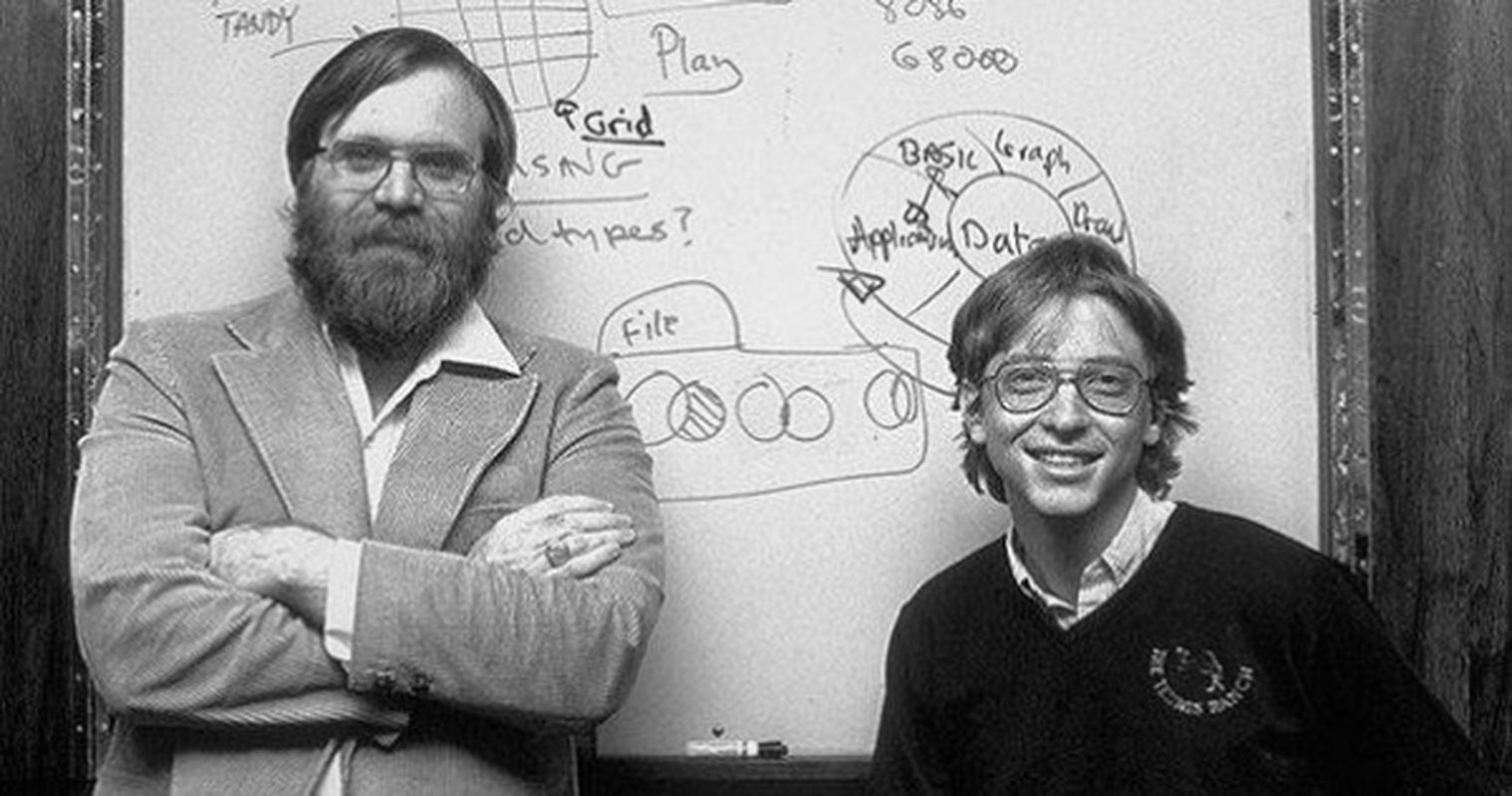How do startups per billion appear? Can you learn to do such projects?
Beginning startups and businessmen from the IT world, whose business is not particularly enchanting, are often asked by the same question: “Is it possible to learn how to make successful Internet projects and mobile applications?”. It would seem that the answer is obvious - we see hundreds of extremely successful startups-supernovae, which sometimes in just a few months throw their founders into the stratosphere of success and wealth. The psychology of an ordinary person says that you just need to find out how and what the superstars did, then apply this knowledge to your business.

Recently a guy from the team of the founders of the next travel startup turned to me for advice. The guys removed the office, filed the application, engaged in promotion. Well, in general, everything is as usual. And I ask him: "Tell me, what is your most important task or problem?" Well, he says that everything seems to be good and there are no special problems. Only here is the only catch - he comes to the office, and he wants to eat before lunch, and sleep after lunch. Well, even on Mondays to get up in the morning is especially difficult. These inconveniences prevent him from mastering the Buddhist skill in contextual advertising, the Jedi technique of advancing through social networks and honing the blade of the skill of usability. Grow Hacks is also studying for some fashionable method.
')
In such a short story of this guy, I saw two key mistakes of startups at once. Two delusions are so ingrained in the minds of the children that they form their worldview. These are intrusive errors:
1. Success in any business can be learned by adopting the experience of others.
2. The motivation and emotions that a businessman experiences in relation to his business are irrelevant. Any case can be “pressed on”, with clenched teeth and through “I don't want” - the main thing is to be able to make yourself learn and work.
Well, the first delusion is formed in us since childhood - indeed, it is obvious to everyone that everything in the world has its own reason. Conclusion - it is necessary to find out the reasons for success - and this means learning something.
But let's see if this is true? Let us apply logic and ask the most correct question: “Why did Bill Gates, Larry Ellison, Ilon Musk, Jack Ma ... not have at least a couple of thousand students - billionaires who would expand the Forbes list?”. Ok, maybe Ilona simply does not have time to study students. But after all, Gates and Allison have long been almost retired and are engaged in third-party projects. Did nobody ask them to study? Or maybe they feel sorry for sharing their knowledge? Yes, it seems not similar. Gates spends half of his fortune on charity and calls the fight against poverty his main dream. In the end, billionaires could train their children to make money from scratch. However, we do not see students of superstars flooding Business Olympus.
Why is that?
Someone prefers to read articles, and someone to watch the video. Video content and articles complement each other, not copy.
Incredible success as a chain of random events
Let's start with the origins and imagine - that means young Bill Gates and Paul Allen are sitting, thinking what to do, what business to stir up. And Bill says: “Come on, buddy Paul, we will analyze the computer market according to all the rules of the MBA”. Of course, this situation looks ridiculous - at the time Microsoft founded the computer market, it simply did not exist.

In fact, the way Gates looks like a chain of accidents. A chain of incredible, damn lucky accidents, which eventually led to the creation of a corporation. There are several stories of the formation of Microsoft, but they all draw a chain of strange, groundless events. Here Bill, for some reason, became interested in programming, although at that time it was more of an underground occupation, very strange for a young man. Then, he was ordered to create an operating system for IBM computers that had just appeared. After an accident happens, which seems like a disastrous stupidity on the part of IBM over time. The blue giant gave up Ms-DOS rights, and it quickly turned into Windows, enriching Gates. Then came Linux - a free version of Windows. Many predicted the devastation of Microsoft under the pressure of free software, but in fact it turned out exactly the opposite. The lion's share of corporate users, and even ordinary people, once having tried Linux, spat for a long time from an insufficiently comprehensible OS and finally opted for Windows, bringing money to Gates. Then Bill’s brainchild was struck by another seemingly fatal blow from the pirates, who were spreading hacked Windows systems all over the world. Paradoxically, millions of pirated copies again played into the hands of insidious Bill - years went by, people from not the richest countries got used to hacked Windows, then their wealth improved, they occupied posts at enterprises, and of course they bought Windows and carried money gates.
The success of Gates looks like he wins big in a lottery, then wins again ... and again ... and again ... Damn lucky guy, as if he is favored by someone from above.
Now let's look at Google and find ... the same chain of random events. Here at Stanford the case brought Larry Page and Sergey Brin. Here they are somehow interested in searching for scientific publications. Scientists in their works love to put links to other people's publications. As a result, appeared Page Rank - the main weapon of Google. And so it was a coincidence that the Internet, which was gaining strength at the time, was built on the principles of scientific publications - the pages of websites simply adored to refer to other pages. And it turned out that Page Rank (created for scientific publications) is suitable for improving the search on the Internet.

Then Larry and Sergey simply approached Professor Stanford when he parked his bike and suggested that he invest in Google, which at that time had no name. And what do you think? The professor immediately wrote a check to young entrepreneurs. If the reason for such an act of a professor is clear to you, then try yourself to create a similar trick by getting investments in your project. It is important to note that for several years Google didn’t have a clue what it would make. Many thought that the company was waiting for a pitiful death from lack of money. Then, of course, quite by accident, came the rescue in the face of Scott Banister, who invented GoTo - a search engine advertising sales system based on an auction basis - the system is actually quite tricky and not obvious. So now Google is essentially an advertising corporation - it receives the main income from advertising. You can further analyze the history of the search engine, but it is already clear that we again see a chain of random events leading Google to success.
However, in a series of incredibly successful accidents, Steve Jobs, of course, bypassed all.

If you describe Apple in one word, this word will be “design”. Apple's design is perfect in everything, from the ergonomic iPhone and Mac casing, to the design of the operating system and native mobile phone applications. So Jobs liked to remember that in his youth he accidentally enrolled in a calligraphy course. This is a very rare and unusual course. It was this coincidence that led to the dominant competitive advantage of the most expensive corporation in the world at the moment.
If you still think that some reasons lead to success, then I will hammer the last nail into the coffin of this absurd idea.
Artificial Intelligence as the creator of startups
Living in Silicon Valley, I learned about one very interesting experiment. Silicon Valley is the habitat of the richest venture capital investors, they even have their own Sand Hill Road there. So, investors often suffer from founders of startups in which they have invested, for example, a couple of hundred million dollars. But the founders are just people, they constantly have troubles - they will quarrel with the girl and go into the drinking bout, then they will leave for the tropical islands to experience an existential crisis. Investors are periodically bored, and they think how to improve their lives. And such a case they recently introduced themselves. Now the technologies of artificial intelligence are rapidly developing. Computers already know better than people to recognize pictures, Siri speaks in a human voice, and IBM Watson reads absolutely all emerging publications on oncological diseases and already diagnoses patients and prescribes treatment many times better than certified doctors. So, insidious investors thought, why not use AI to create successful startups? They decided - they did it.

Having access even to secret developments in the field of AI (investors invest in such firms and are friends with the founders), a conglomerate of investors created a special AI, which read all the literature, all the interviews, all the numbers on startups available on the network. AI analyzed all past information and monitored in real time all the news from fresh projects.
Try to think about it - not a single person in the world can master all the knowledge that an AI swallows in a day. No one person can be online all day and night and immediately find out all the information important for a startup. AI monitors the network around the clock. It’s just useless to compete with such an AI - IBM Watson proved this idea in the field of oncology treatment.
This AI began to generate startup ideas. Then, for each startup, one-page landings with the collection of email addresses were made. Landings were in the style: “Hi, we are in a closed beta now, but you can leave your email and we will send you an invitation immediately after the launch of the project.” In general, the classic Lean Startup. Investors buying a couple of millions of communities in Facebook and published in them links to new landings. The rule was as follows - if the landing page gathered a sufficient number of people who wanted to use the project, then such a startup was really created.
Investors thought they got their hands on the perfect money printing machine. No founder can compete with Artificial Intelligence. Such a computer will quickly capture all the markets.
But one factor pleased investors especially strongly - AI does not require its share in a startup! Everything goes to investors.
What do you think, how many successful projects have you managed to launch using Artificial Intelligence? No one. All startups are burned out.
This example proves that successful projects are not created at all for some reason and the level of knowledge and training does not play a decisive role. After all, AI is the ideal student who knows and is able more than any person. Artificial Intelligence is the ideal machine for the realization of cause-effect relationships.
Why does a person make startups better than Artificial Intelligence?
But why IBM Watson could not create any successful startup? Here we have to ask ourselves: “How is Artificial Intelligence different from people? How are people strong and why can they win in business? ” Yes, here we unexpectedly moved from the technical topic of the IT world familiar to us and we will have to delve into philosophy and psychology. It is these areas that actually determine the success of projects. A thought unexpected for many.
However, this idea has already been understood in Silicon Valley, where specialists in the humanities are beginning to dominate. For example, Stuart Butterfield, the creator of Slack, has a degree in philosophy of mind and recently led his company to capitalize over a billion. In the past, bias towards programmers was observed solely because of the newness of the IT industry. It’s just that there were too few technical specialists and that’s why they paid so much. But now the situation is changing.
So, people differ from machines in that a person can feel, experience emotions. And this incredible advantage shows that the field of creating startups is closely related to human psychology. Having studied modern neuropsychology, quantum physics and the science of consciousness, I created a theory, which I will discuss at the end of the article.
Remember the second startup error? Allegedly, the lack of motivation is not important. So, it is motivation, faith in the project, passion for their work that distinguishes a person from a smart, but insensitive machine. People may experience feelings, and this is their unbeatable advantage. When a person burns with his project, his desire to change the world for the better, then everything becomes easy and simple for him. Setting up contextual advertising seems to be an elementary thing, a couple of sleepless nights brings satisfaction. As an example of AirBnB, his fighter Brian Chesky, yesterday's student of the faculty of industrial design, easily learned to build and manage a billion-dollar company. Superstar startups are often ignited by students who did not even have time to graduate from university, not to mention MBA courses. This suggests that the main thing is a vision, and everything else is easy to learn.
New feudalism. Why win with vision?
It's all about feudalism. Probably, you think that feudalism remained far away in the middle ages. See if this is true? Previously successful were people owning land. If you have an estate, then you can let the peasants work on your land and give you a portion of the harvest. If there is no estate, then you will be forced to hump and work all your life without getting lost. There was only one way to get rich (if you did not get the inheritance) - is to open or seize new lands. However, the majority understood that the seizure of a foreign land by force of arms was not their way. And look for new lands ... but how? After all, the land is flat, if you go far enough, you can just fall off the edge of the earth. Already in the Middle Ages, we see how the vision works - it is enough to understand how to get out of the framework of your own worldview and you can conquer the world. What did Columbus do when he realized that the earth was round - he immediately discovered the rich free lands. Then, in the time of the wild west, there was a gold rush. Feudalism has changed somewhat. Now the one who has found a gold mine has grown rich. This is again the seizure of some property. You can not be too smart, you can be quite lazy, but if you find a gold mine, then you are rich.

Nowadays, companies are seizing niches. This is the same feudalism. Google has taken a search niche and that's it. Even Microsoft with its Bing cannot displace Google. Bryn and Paige can splurge as much as they want on how hard their companies are in the market, but the fact remains - no intelligence and hard work of competitors can move Google. Facebook has captured the niche of social networks and dominates it, increasing and increasing its capitalization. In general, now feudalism is manifested in the fact that you just need to find a niche, about which no one knows and seize it. And oddly enough, it will be a matter with which the dropout student will cope. The whole difficulty is, like Columbus, to expand your world view and see a new opportunity. And this is from the field of psychology.
So, we have discussed 2 secrets of billions of companies, summarizing:
1. Analysis shows that billions of startups are created using a chain of seemingly random events.
2. This chain of events is somehow connected with the consciousness of the founders (namely, emotions do not have AI, which does not manage to create startups).
Having studied modern neuropsychology, quantum mechanics and the science of human consciousness, I created a theory that is called rather unusual: "The attraction of the future." The theory explains how it is possible to “include” successful vision and motivation, which will lead to success. Publish updates here: the attraction of the future
PS: You know, they also say that for success you just have to work a lot, very much. Then I immediately recall my neighbor, Uncle Senya. So he spent his whole life a lot, he worked a lot at the plant at the lathe. Now he has retired and he has nothing to repair the old penny. On the other hand, Richard Branson, the founder of the multibrand Virgin, in his book “Losing Innocence”, tells how he promoted the record company, “screamed”, spending months on end on his yacht, where he invited all sorts of stars to conclude contracts, and every evening got drunk at a party . On YouTube, you can find programs from the series “One day in the life of a businessman.” If you look at these videos, then it is completely incomprehensible what exactly their overwork is. They mainly hold meetings and participate in meetings. In fact, these people are very passionate about their work and tell their vision, obtained through the "Attraction of the Future", this is essentially the only and such valuable quality that leads to success.
Richard Branson:

Once in the days of Apple's formation, Wozniak declared Jobs: “Listen Steve, you really can't do anything, because I collect computers. And you, Steve, just do what you tell people about how computers will change the world. ” This example most clearly demonstrates the work of "Attraction of the Future." The main thing is the vision and passion for their work. The rest will follow.

Recently a guy from the team of the founders of the next travel startup turned to me for advice. The guys removed the office, filed the application, engaged in promotion. Well, in general, everything is as usual. And I ask him: "Tell me, what is your most important task or problem?" Well, he says that everything seems to be good and there are no special problems. Only here is the only catch - he comes to the office, and he wants to eat before lunch, and sleep after lunch. Well, even on Mondays to get up in the morning is especially difficult. These inconveniences prevent him from mastering the Buddhist skill in contextual advertising, the Jedi technique of advancing through social networks and honing the blade of the skill of usability. Grow Hacks is also studying for some fashionable method.
')
In such a short story of this guy, I saw two key mistakes of startups at once. Two delusions are so ingrained in the minds of the children that they form their worldview. These are intrusive errors:
1. Success in any business can be learned by adopting the experience of others.
2. The motivation and emotions that a businessman experiences in relation to his business are irrelevant. Any case can be “pressed on”, with clenched teeth and through “I don't want” - the main thing is to be able to make yourself learn and work.
Well, the first delusion is formed in us since childhood - indeed, it is obvious to everyone that everything in the world has its own reason. Conclusion - it is necessary to find out the reasons for success - and this means learning something.
But let's see if this is true? Let us apply logic and ask the most correct question: “Why did Bill Gates, Larry Ellison, Ilon Musk, Jack Ma ... not have at least a couple of thousand students - billionaires who would expand the Forbes list?”. Ok, maybe Ilona simply does not have time to study students. But after all, Gates and Allison have long been almost retired and are engaged in third-party projects. Did nobody ask them to study? Or maybe they feel sorry for sharing their knowledge? Yes, it seems not similar. Gates spends half of his fortune on charity and calls the fight against poverty his main dream. In the end, billionaires could train their children to make money from scratch. However, we do not see students of superstars flooding Business Olympus.
Why is that?
Someone prefers to read articles, and someone to watch the video. Video content and articles complement each other, not copy.
Incredible success as a chain of random events
Let's start with the origins and imagine - that means young Bill Gates and Paul Allen are sitting, thinking what to do, what business to stir up. And Bill says: “Come on, buddy Paul, we will analyze the computer market according to all the rules of the MBA”. Of course, this situation looks ridiculous - at the time Microsoft founded the computer market, it simply did not exist.

In fact, the way Gates looks like a chain of accidents. A chain of incredible, damn lucky accidents, which eventually led to the creation of a corporation. There are several stories of the formation of Microsoft, but they all draw a chain of strange, groundless events. Here Bill, for some reason, became interested in programming, although at that time it was more of an underground occupation, very strange for a young man. Then, he was ordered to create an operating system for IBM computers that had just appeared. After an accident happens, which seems like a disastrous stupidity on the part of IBM over time. The blue giant gave up Ms-DOS rights, and it quickly turned into Windows, enriching Gates. Then came Linux - a free version of Windows. Many predicted the devastation of Microsoft under the pressure of free software, but in fact it turned out exactly the opposite. The lion's share of corporate users, and even ordinary people, once having tried Linux, spat for a long time from an insufficiently comprehensible OS and finally opted for Windows, bringing money to Gates. Then Bill’s brainchild was struck by another seemingly fatal blow from the pirates, who were spreading hacked Windows systems all over the world. Paradoxically, millions of pirated copies again played into the hands of insidious Bill - years went by, people from not the richest countries got used to hacked Windows, then their wealth improved, they occupied posts at enterprises, and of course they bought Windows and carried money gates.
The success of Gates looks like he wins big in a lottery, then wins again ... and again ... and again ... Damn lucky guy, as if he is favored by someone from above.
Now let's look at Google and find ... the same chain of random events. Here at Stanford the case brought Larry Page and Sergey Brin. Here they are somehow interested in searching for scientific publications. Scientists in their works love to put links to other people's publications. As a result, appeared Page Rank - the main weapon of Google. And so it was a coincidence that the Internet, which was gaining strength at the time, was built on the principles of scientific publications - the pages of websites simply adored to refer to other pages. And it turned out that Page Rank (created for scientific publications) is suitable for improving the search on the Internet.

Then Larry and Sergey simply approached Professor Stanford when he parked his bike and suggested that he invest in Google, which at that time had no name. And what do you think? The professor immediately wrote a check to young entrepreneurs. If the reason for such an act of a professor is clear to you, then try yourself to create a similar trick by getting investments in your project. It is important to note that for several years Google didn’t have a clue what it would make. Many thought that the company was waiting for a pitiful death from lack of money. Then, of course, quite by accident, came the rescue in the face of Scott Banister, who invented GoTo - a search engine advertising sales system based on an auction basis - the system is actually quite tricky and not obvious. So now Google is essentially an advertising corporation - it receives the main income from advertising. You can further analyze the history of the search engine, but it is already clear that we again see a chain of random events leading Google to success.
However, in a series of incredibly successful accidents, Steve Jobs, of course, bypassed all.

If you describe Apple in one word, this word will be “design”. Apple's design is perfect in everything, from the ergonomic iPhone and Mac casing, to the design of the operating system and native mobile phone applications. So Jobs liked to remember that in his youth he accidentally enrolled in a calligraphy course. This is a very rare and unusual course. It was this coincidence that led to the dominant competitive advantage of the most expensive corporation in the world at the moment.
If you still think that some reasons lead to success, then I will hammer the last nail into the coffin of this absurd idea.
Artificial Intelligence as the creator of startups
Living in Silicon Valley, I learned about one very interesting experiment. Silicon Valley is the habitat of the richest venture capital investors, they even have their own Sand Hill Road there. So, investors often suffer from founders of startups in which they have invested, for example, a couple of hundred million dollars. But the founders are just people, they constantly have troubles - they will quarrel with the girl and go into the drinking bout, then they will leave for the tropical islands to experience an existential crisis. Investors are periodically bored, and they think how to improve their lives. And such a case they recently introduced themselves. Now the technologies of artificial intelligence are rapidly developing. Computers already know better than people to recognize pictures, Siri speaks in a human voice, and IBM Watson reads absolutely all emerging publications on oncological diseases and already diagnoses patients and prescribes treatment many times better than certified doctors. So, insidious investors thought, why not use AI to create successful startups? They decided - they did it.

Having access even to secret developments in the field of AI (investors invest in such firms and are friends with the founders), a conglomerate of investors created a special AI, which read all the literature, all the interviews, all the numbers on startups available on the network. AI analyzed all past information and monitored in real time all the news from fresh projects.
Try to think about it - not a single person in the world can master all the knowledge that an AI swallows in a day. No one person can be online all day and night and immediately find out all the information important for a startup. AI monitors the network around the clock. It’s just useless to compete with such an AI - IBM Watson proved this idea in the field of oncology treatment.
This AI began to generate startup ideas. Then, for each startup, one-page landings with the collection of email addresses were made. Landings were in the style: “Hi, we are in a closed beta now, but you can leave your email and we will send you an invitation immediately after the launch of the project.” In general, the classic Lean Startup. Investors buying a couple of millions of communities in Facebook and published in them links to new landings. The rule was as follows - if the landing page gathered a sufficient number of people who wanted to use the project, then such a startup was really created.
Investors thought they got their hands on the perfect money printing machine. No founder can compete with Artificial Intelligence. Such a computer will quickly capture all the markets.
But one factor pleased investors especially strongly - AI does not require its share in a startup! Everything goes to investors.
What do you think, how many successful projects have you managed to launch using Artificial Intelligence? No one. All startups are burned out.
This example proves that successful projects are not created at all for some reason and the level of knowledge and training does not play a decisive role. After all, AI is the ideal student who knows and is able more than any person. Artificial Intelligence is the ideal machine for the realization of cause-effect relationships.
Why does a person make startups better than Artificial Intelligence?
But why IBM Watson could not create any successful startup? Here we have to ask ourselves: “How is Artificial Intelligence different from people? How are people strong and why can they win in business? ” Yes, here we unexpectedly moved from the technical topic of the IT world familiar to us and we will have to delve into philosophy and psychology. It is these areas that actually determine the success of projects. A thought unexpected for many.
However, this idea has already been understood in Silicon Valley, where specialists in the humanities are beginning to dominate. For example, Stuart Butterfield, the creator of Slack, has a degree in philosophy of mind and recently led his company to capitalize over a billion. In the past, bias towards programmers was observed solely because of the newness of the IT industry. It’s just that there were too few technical specialists and that’s why they paid so much. But now the situation is changing.
So, people differ from machines in that a person can feel, experience emotions. And this incredible advantage shows that the field of creating startups is closely related to human psychology. Having studied modern neuropsychology, quantum physics and the science of consciousness, I created a theory, which I will discuss at the end of the article.
Remember the second startup error? Allegedly, the lack of motivation is not important. So, it is motivation, faith in the project, passion for their work that distinguishes a person from a smart, but insensitive machine. People may experience feelings, and this is their unbeatable advantage. When a person burns with his project, his desire to change the world for the better, then everything becomes easy and simple for him. Setting up contextual advertising seems to be an elementary thing, a couple of sleepless nights brings satisfaction. As an example of AirBnB, his fighter Brian Chesky, yesterday's student of the faculty of industrial design, easily learned to build and manage a billion-dollar company. Superstar startups are often ignited by students who did not even have time to graduate from university, not to mention MBA courses. This suggests that the main thing is a vision, and everything else is easy to learn.
New feudalism. Why win with vision?
It's all about feudalism. Probably, you think that feudalism remained far away in the middle ages. See if this is true? Previously successful were people owning land. If you have an estate, then you can let the peasants work on your land and give you a portion of the harvest. If there is no estate, then you will be forced to hump and work all your life without getting lost. There was only one way to get rich (if you did not get the inheritance) - is to open or seize new lands. However, the majority understood that the seizure of a foreign land by force of arms was not their way. And look for new lands ... but how? After all, the land is flat, if you go far enough, you can just fall off the edge of the earth. Already in the Middle Ages, we see how the vision works - it is enough to understand how to get out of the framework of your own worldview and you can conquer the world. What did Columbus do when he realized that the earth was round - he immediately discovered the rich free lands. Then, in the time of the wild west, there was a gold rush. Feudalism has changed somewhat. Now the one who has found a gold mine has grown rich. This is again the seizure of some property. You can not be too smart, you can be quite lazy, but if you find a gold mine, then you are rich.

Nowadays, companies are seizing niches. This is the same feudalism. Google has taken a search niche and that's it. Even Microsoft with its Bing cannot displace Google. Bryn and Paige can splurge as much as they want on how hard their companies are in the market, but the fact remains - no intelligence and hard work of competitors can move Google. Facebook has captured the niche of social networks and dominates it, increasing and increasing its capitalization. In general, now feudalism is manifested in the fact that you just need to find a niche, about which no one knows and seize it. And oddly enough, it will be a matter with which the dropout student will cope. The whole difficulty is, like Columbus, to expand your world view and see a new opportunity. And this is from the field of psychology.
So, we have discussed 2 secrets of billions of companies, summarizing:
1. Analysis shows that billions of startups are created using a chain of seemingly random events.
2. This chain of events is somehow connected with the consciousness of the founders (namely, emotions do not have AI, which does not manage to create startups).
Having studied modern neuropsychology, quantum mechanics and the science of human consciousness, I created a theory that is called rather unusual: "The attraction of the future." The theory explains how it is possible to “include” successful vision and motivation, which will lead to success. Publish updates here: the attraction of the future
PS: You know, they also say that for success you just have to work a lot, very much. Then I immediately recall my neighbor, Uncle Senya. So he spent his whole life a lot, he worked a lot at the plant at the lathe. Now he has retired and he has nothing to repair the old penny. On the other hand, Richard Branson, the founder of the multibrand Virgin, in his book “Losing Innocence”, tells how he promoted the record company, “screamed”, spending months on end on his yacht, where he invited all sorts of stars to conclude contracts, and every evening got drunk at a party . On YouTube, you can find programs from the series “One day in the life of a businessman.” If you look at these videos, then it is completely incomprehensible what exactly their overwork is. They mainly hold meetings and participate in meetings. In fact, these people are very passionate about their work and tell their vision, obtained through the "Attraction of the Future", this is essentially the only and such valuable quality that leads to success.
Richard Branson:

Once in the days of Apple's formation, Wozniak declared Jobs: “Listen Steve, you really can't do anything, because I collect computers. And you, Steve, just do what you tell people about how computers will change the world. ” This example most clearly demonstrates the work of "Attraction of the Future." The main thing is the vision and passion for their work. The rest will follow.
Source: https://habr.com/ru/post/293866/
All Articles